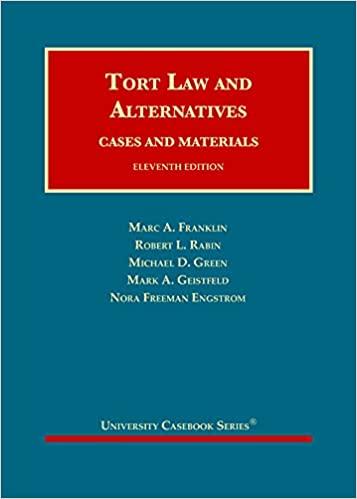Question
Dick and Carlton were arrested for a burglary. Dick was taken to the police station. After three hours of interrogation, without any Miranda warning, the
Dick and Carlton were arrested for a burglary. Dick was taken to the police station. After three hours of interrogation, without any Miranda warning, the police officer asked Dick if he would consent to a search of his briefcase. Dick consented to the search of his brief case. The search revealed a handgun, and tools that generally are used by professional burglars, which were seized by the officer. When the officer told Dick what he found, and informed him that the handgun was reported stolen, Dick confessed to the burglary.
Carlton, who did not know that Dick had confessed, then confessed and named Dick as his co-felon. At their joint trial on a charge of burglary, Dick moved to exclude his confession from evidence based solely on the failure of the police to give him Miranda warnings. Based only on that violation, the court granted the motion to exclude his confession.
Dick also moved to exclude from evidence the handgun and the burglary tools seized from his brief case, claiming that he was not aware that he had a right to refuse consent to search. The prosecutor conceded that the police had no authority to search his brief case absent consent, but asserted that Dick's consent was obtained without coercion. The court denied the motion, finding that the consent was voluntary.
The handgun and burglar tools seized from Dick's brief case were admitted into evidence at the joint trial of Dick and Carlton over objections by each defendant. Carlton's confession, redacted to eliminate any reference to Dick, was admitted into evidence against Carlton. At trial Dick testified, denying that he participated and he did not know that the handgun or burglary tools were in his brief case. He testified that he had loaned his brief case to Carlton on the day of the burglary. In rebuttal the prosecutor called a police officer who testified, over objection by Dick, to the contents of Dick's confession and to the contents of Carlton's complete unredacted confession implicating Dick as a participant in the burglary.
Assume that in each instance all appropriate constitutional and evidentiary objections were made.
- Did the court err in admitting the handgun and the burglary tools seized from Dick's brief case against Dick and Carlton? Discuss.
- Did the court err in admitting the police officer's testimony about Dick's confession? Discuss.
Step by Step Solution
There are 3 Steps involved in it
Step: 1

Get Instant Access to Expert-Tailored Solutions
See step-by-step solutions with expert insights and AI powered tools for academic success
Step: 2

Step: 3

Ace Your Homework with AI
Get the answers you need in no time with our AI-driven, step-by-step assistance
Get Started


